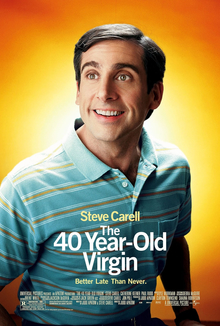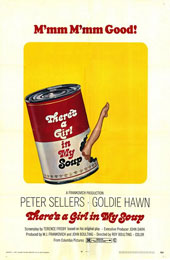
The comedy film is a film genre that emphasizes humor. These films are designed to amuse audiences and make them laugh. Films in this genre typically have a happy ending, with dark comedy being an exception to this rule. Comedy is one of the oldest genres in film, and it is derived from classical comedy in theatre. Some of the earliest silent films were slapstick comedies, which often relied on visual depictions, such as sight gags and pratfalls, so they could be enjoyed without requiring sound. To provide drama and excitement to silent movies, live music was played in sync with the action on the screen, on pianos, organs, and other instruments. When sound films became more prevalent during the 1920s, comedy films grew in popularity, as laughter could result from both burlesque situations but also from humorous dialogue.

A joke is a display of humour in which words are used within a specific and well-defined narrative structure to make people laugh and is usually not meant to be interpreted literally. It usually takes the form of a story, often with dialogue, and ends in a punch line, whereby the humorous element of the story is revealed; this can be done using a pun or other type of word play, irony or sarcasm, logical incompatibility, hyperbole, or other means. Linguist Robert Hetzron offers the definition:
A joke is a short humorous piece of oral literature in which the funniness culminates in the final sentence, called the punchline… In fact, the main condition is that the tension should reach its highest level at the very end. No continuation relieving the tension should be added. As for its being "oral," it is true that jokes may appear printed, but when further transferred, there is no obligation to reproduce the text verbatim, as in the case of poetry.

National Lampoon was an American humor magazine that ran from 1970 to 1998. The magazine started out as a spinoff from The Harvard Lampoon.

Humour or humor is the tendency of experiences to provoke laughter and provide amusement. The term derives from the humoral medicine of the ancient Greeks, which taught that the balance of fluids in the human body, known as humours, controlled human health and emotion.

Stand-up comedy is a performance directed to a live audience, where the performer stands on a stage and delivers humorous and satirical monologues sometimes incorporating physical acts. These performances are typically composed of rehearsed scripts but often include varying degrees of live crowd interaction. Stand-up comedy consists of one-liners, stories, observations, or shticks that can employ props, music, impressions, magic tricks, or ventriloquism.

Black comedy, also known as black humor, bleak comedy, dark comedy, dark humor, gallows humor or morbid humor, is a style of comedy that makes light of subject matter that is generally considered taboo, particularly subjects that are normally considered serious or painful to discuss. Writers and comedians often use it as a tool for exploring vulgar issues by provoking discomfort, serious thought, and amusement for their audience. Thus, in fiction, for example, the term black comedy can also refer to a genre in which dark humor is a core component. Cartoonist Charles Addams was famous for such humor, e.g. depicting a boy decorating his bedroom with stolen warning signs including "NO DIVING – POOL EMPTY", "STOP – BRIDGE OUT" and "SPRING CONDEMNED."

Leslie Jean Mann is an American actress. She has appeared in numerous films, including The Cable Guy (1996), She's the One (1996), George of the Jungle (1997), Big Daddy (1999), Orange County (2002), The 40-Year-Old Virgin (2005), Knocked Up (2007), Drillbit Taylor (2008), I Love You Phillip Morris (2009), 17 Again (2009), Funny People (2009), This Is 40 (2012), The Other Woman (2014), and Blockers (2018).

Self-referential humor, also known as self-reflexive humor, self-aware humor, or meta humor, is a type of comedic expression that—either directed toward some other subject, or openly directed toward itself—is self-referential in some way, intentionally alluding to the very person who is expressing the humor in a comedic fashion, or to some specific aspect of that same comedic expression. Here, meta is used to describe that the joke explicitly talks about other jokes, a usage similar to the words metadata, metatheatrics and metafiction. Self-referential humor expressed discreetly and surrealistically is a form of bathos. In general, self-referential humor often uses hypocrisy, oxymoron, or paradox to create a contradictory or otherwise absurd situation that is humorous to the audience.

Surreal humour is a form of humour predicated on deliberate violations of causal reasoning, thus producing events and behaviors that are obviously illogical. Portrayals of surreal humour tend to involve bizarre juxtapositions, incongruity, non-sequiturs, irrational or absurd situations, and expressions of nonsense.

Judd Apatow is an American director, producer, screenwriter and comedian, best known for his work in comedy films. He is the founder of Apatow Productions, through which he produced and directed the films The 40-Year-Old Virgin (2005), Knocked Up (2007), Funny People (2009), This Is 40 (2012), Trainwreck (2015), The King of Staten Island (2020), and The Bubble (2022).

The 40-Year-Old Virgin is a 2005 American romantic comedy film directed by Judd Apatow, who produced the film with Clayton Townsend and Shauna Robertson. It features Steve Carell as the titular 40-year-old virgin Andy, an employee at an electronics store. Paul Rudd, Romany Malco, and Seth Rogen play co-workers who resolve to help him lose his virginity, and Catherine Keener stars as Andy's love interest, Trish.
The Frat Pack is a nickname given to a group of American comedy actors who have appeared together in many of the highest-grossing comedy films since the mid-1990s. The group is usually considered to include Ben Stiller, Owen Wilson, Luke Wilson, Will Ferrell, Steve Carell, Jack Black, Paul Rudd and Vince Vaughn.
Observational comedy is a form of humor based on the commonplace aspects of everyday life. It is one of the main types of humor in stand-up comedy. In an observational comedy act, the comedian makes an observation about something which is common enough to be familiar to their audience, but not commonly discussed. Such observations are typically presented with the phrase "Have you ever noticed...?" or "Did you ever notice...?" which has become a comedy cliché.

There's a Girl in My Soup is a 1970 British romantic comedy film directed by Roy Boulting and starring Peter Sellers and Goldie Hawn. It was written by Terence Frisby based on the 1966 stage play of the same name by Terence Frisby.

Knocked Up is a 2007 American romantic comedy film written, produced and directed by Judd Apatow, and starring Seth Rogen, Katherine Heigl, Paul Rudd, Leslie Mann, Jay Baruchel, Jonah Hill, Jason Segel and Martin Starr. It follows the repercussions of a drunken one-night stand between a slacker and a recently promoted media personality that results in an unintended pregnancy.
Sex comedy, erotic comedy or more broadly sexual comedy is a genre in which comedy is motivated by sexual situations and love affairs. Although "sex comedy" is primarily a description of dramatic forms such as theatre and film, literary works such as those of Ovid and Giovanni Boccaccio may be considered sex comedies.
Although humor is a phenomenon experienced by most humans, its exact cause is a topic of heavy debate. There are many theories of humor which attempt to explain what it is, what social functions it serves, and what would be considered humorous. Although various classical theories of humor and laughter may be found, in contemporary academic literature, three theories of humor appear repeatedly: relief theory, superiority theory, and incongruity theory. These theories are used as building blocks for the rest of the theories. Among current humor researchers, there has yet to be a consensus about which of these three theories of humor is most viable. Some proponents of each theory originally claimed that theirs, and theirs alone, explained all cases of humor. However, they now acknowledge that although each theory generally covers its area of focus, many instances of humor can be explained by more than one theory. Similarly, one view holds that theories have a combinative effect; Jeroen Vandaele claims that incongruity and superiority theories describe complementary mechanisms that together create humor.

Comedy is a genre that consists of discourses or works intended to be humorous or amusing by inducing laughter, especially in theatre, film, stand-up comedy, television, radio, books, or any other entertainment medium. The term originated in ancient Greece: In Athenian democracy, the public opinion of voters was influenced by political satire performed by comic poets in theaters. The theatrical genre of Greek comedy can be described as a dramatic performance pitting two groups, ages, genders, or societies against each other in an amusing agon or conflict. Northrop Frye depicted these two opposing sides as a "Society of Youth" and a "Society of the Old". A revised view characterizes the essential agon of comedy as a struggle between a relatively powerless youth and the societal conventions posing obstacles to his hopes. In this struggle, the youth then becomes constrained by his lack of social authority, and is left with little choice but to resort to ruses which engender dramatic irony, which provokes laughter.
A bromantic comedy is a comedy film genre that takes the formula of the typical "romantic comedy" but focuses on close male friendships.

The Bible and humor is a topic of Biblical criticism concerned with the question of whether parts of the Bible were intended to convey humor in any style. Historically, this topic has not received much attention, but modern scholars generally agree that humor can be found in biblical texts.















